Unsurprisingly, technology in kitchen gardening has transformed in the age of intelligent residences, where technology aids in virtually every facet of life—from entertainment to security. By seamlessly integrating sustainability and innovation, smart kitchen garden technology brings the garden closer to the kitchen than ever.
This extensive discourse explores the advancements transforming kitchen gardens into modern spaces, the advantages they provide, and the prospective trajectory of home food cultivation.
Technology in Kitchen Gardening
In conjunction with a heightened consciousness regarding organic cuisine, the drive for self-sufficiency has reignited enthusiasm for kitchen gardening. In contrast to conventional approaches, contemporary kitchen gardens utilize cutting-edge technologies to maximize growth conditions, preserve resources, and augment produce yield—all from the comfort of our residences.
The advantages and bright future of innovative kitchen garden technology are discussed in this article, along with its constituent parts.
Also Read: What New Methods And Technologies Revolutionized Agriculture
12 Smart Kitchen Garden Innovations
Urban living frequently entails restricted space for conventional gardening endeavors; however, cutting-edge technologies have made cultivating a verdant thumb more attainable. Emerging intelligent kitchen garden innovations combine efficiency, connectivity, and convenience.
In addition to satisfying the requirements of contemporary urbanites, these technologies promote sustainable lifestyles. I am discerning twelve revolutionary advancements that are fundamentally transforming kitchen gardens.
1. Modular Hydroponic Systems
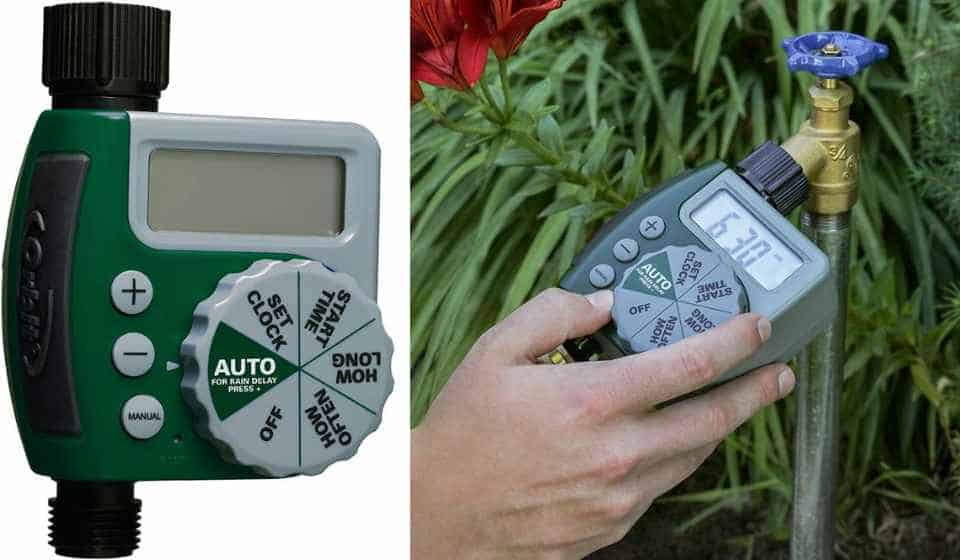
Click image to check on Amazon
Hydroponics has significantly transformed the landscape, and the advent of modular systems facilitates the customization of kitchen garden configurations. Users can expand their gardens as necessary by cultivating various herbs, greens, and even small vegetables without soil using products such as AeroGarden and iHarvest.
2. Smart Herb Gardens
Intelligent, compact herb gardens, such as Click & Grow, provide the ideal environment for the growth of herbs indoors. These systems integrate integrated illumination, sensors, and self-watering mechanisms to give nourishment and water to vegetation, enabling individuals without gardening expertise to partake in their cultivation.
3. Intelligent Compost Bins
Intelligent composters, such as the Vitamix FoodCycler, convert kitchen refuse into nutrient-rich fertilizer, reducing domestic waste and supplying your kitchen garden with organic sustenance. The process is essential for a closed-loop, environmentally friendly kitchen ecosystem, as it is rapid and innocuous.
4. LED Grow Lights
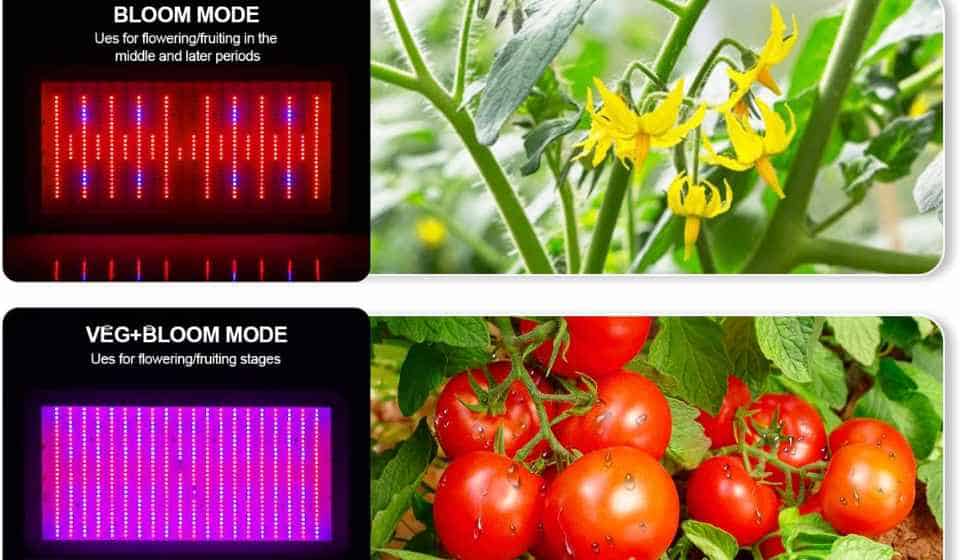
Click the image to buy on Amazon
LED grow lights equipped with sophisticated light spectrum technology, such as GE’s Grow Light LED, deliver the ideal wavelengths of light to promote optimal plant growth. This guarantees that kitchen gardens can flourish even in environments devoid of natural light.
5. Smart Plant Monitors
MiFlora plant sensors from Xiaomi provide up-to-date data on soil moisture, temperature, radiation, and fertilizer concentrations. Linked via Bluetooth to devices, these instruments eliminate uncertainty from plant maintenance.
Also Read: Pros & Cons of Container Gardening: A Comprehensive Guide
6. Indoor Garden Appliances
LG’s Home Chef Garden is an example of an innovation that incorporates indoor horticulture into kitchen appliances. This adjacent-to-the-refrigerator product features climate-controlled LED-lit compartments, thereby streamlining the process of cultivating fresh greenery at home.
7. Automated Watering Systems
Automatic irrigation systems, such as the PlantLink Basil system, deliver water directly to the roots of plants after detecting when they require water via sensors. This technological innovation guarantees optimal hydration for plants, conserving water and encouraging more robust growth.
8. Aquaponic Countertop Gardens
Hydroponics and fishkeeping are combined in aquaponics; fish excrement is used to fertilize the plants, purifying the water for the fish. Countertop Water Garden by Back to the Roots is an ideal conversation starter in the form of a self-cleaning fish aquarium atop which edible plants thrive.
9. Vertical Kitchen Gardens
GardenUp and other space-saving vertical gardens utilize vertical space to cultivate plants. These systems enable dense planting, which renders them well-suited for balconies and compact apartments.
10. Smart Pot Systems
Intelligent containers like the Parrot Pot include sensors and an automated self-watering mechanism. These advanced containers consistently guarantee ideal moisture levels by adapting irrigation schedules to the plant’s requirements.
11. App-Controlled Garden Ecosystems
Systems such as Niwa, which elevate connectivity to the next level, provide an app-managed, entirely connected growing system. Optimize outdoor lighting, temperature, and humidity with the assistance of the application for optimal outcomes.
12. Garden Robots

Click the image to buy on Amazon
FarmBot and other robotic assistants automate the tending, fertilizing, pruning, and planting a small garden plot. They are precise and programmable, enabling a hands-off, high-tech approach to culinary horticulture.
Summary: Innovative kitchen garden technology is evolving, allowing urban residents to participate in small-scale agricultural activities. This integration establishes a foundation for organic, sustainable food from kitchens. As technological advancements decrease barriers to entry, a new generation of tech-savvy cultivators embraces a sustainable and health-conscious lifestyle.
Also Read: 15 Different Styles of Vegetable Gardens
Benefits of Smart Kitchen Garden Technology
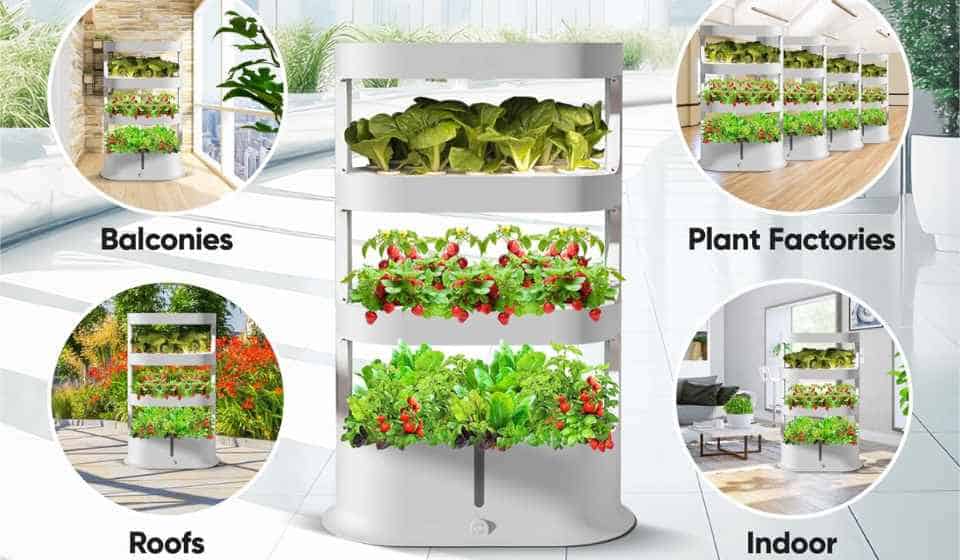
Click the image to buy on Amazon
The accelerated development of smart kitchen garden technology presents novel resolutions to numerous obstacles typically encountered in conventional gardening. The convergence of technology and horticulture has introduced gardening novices and enthusiasts equally into a new era of efficiency, sustainability, and convenience.
The following section examines the numerous advantages of integrating intelligent technology into household gardens.
1. Enhanced Plant Growth
The optimized environment that smart kitchen garden technology generates for plant growth is among its most significant benefits. By incorporating adjustable LED grow lights into systems, the ideal light spectrum for photosynthesis can be replicated, facilitating more rapid and robust plant development irrespective of the ambient weather conditions.
In contrast to conventional soil-based horticulture, hydroponic and aeroponic systems frequently augment plant yields by delivering an optimal equilibrium of nutrients and water.
2. Water and Resource Conservation
Intelligent kitchen gardens exhibit exceptional efficiency, specifically in water utilization. Hydroponic systems can reduce water consumption by as much as 90% compared to soil-based gardens by redistributing water to the plant roots.
Furthermore, these systems reduce the need for pesticides and prevent nutrient loss, contributing to a more environmentally favorable and sustainable gardening practice.
3. Year-Round Harvest
Implementing innovative kitchen garden technology has eliminated the constraints imposed by inclement weather. Climate control systems for indoor horticulture allow users to cultivate fresh fruits, vegetables, and vegetation throughout the year.
The perpetual accessibility of fresh produce enhances convenience and potentially promotes a healthier dietary pattern by encouraging greater consumption of organic, homegrown food.
4. Space Efficiency
Intelligent kitchen gardens optimize spatial utilization and are well-suited for urban residents with restricted access to conventional garden areas. While requiring little space, vertical hydroponic systems and compact countertop gardens produce an abundant harvest.
This characteristic of conserving space permits the growth of fresh produce in even the most compact apartments or houses.
Also Read: Ultimate Vegetable Gardening Styles For Home
5. Ease of Use and Accessibility
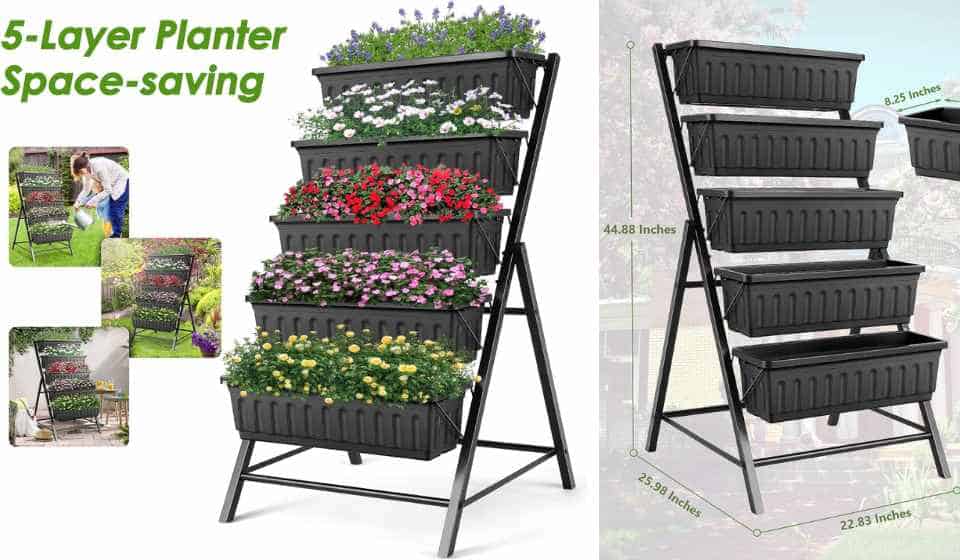
Click the image to buy on Amazon
An inherent characteristic of intelligent kitchen garden technology is its capacity to be easily operated by users. Watering, nutrient delivery, and illumination automation systems eradicate many uncertainties and labor historically associated with horticulture.
Intelligent garden management systems are frequently complemented by user-friendly smartphone applications that deliver timely updates and notifications regarding the garden’s condition. This accessibility facilitates horticulture for individuals who are new to the activity, have limited mobility, or have a hectic lifestyle.
6. Educational Opportunities
Intelligent kitchen gardens provide abundant educational prospects for individuals of all age groups. They provide tangible illustrations of sustainable methodologies and have the potential to impart significant insights regarding plant biology, nutrition, and the criticality of environmental preservation.
The involvement of children in the maintenance of an intelligent kitchen garden can establish a fundamental connection with food sources and nature, thereby promoting the development of nutritious dietary practices.
7. Community and Wellness Benefits
Even a modest garden can yield significant benefits for one’s mental health. Engaging in plant cultivation and observing their development can provide a sense of fulfillment and alleviation of tension.
Furthermore, intelligent kitchen gardens can serve as hubs for community engagement and cooperation, whether through the exchange of produce, the sharing of successful gardening endeavors, or the cultivation of produce in communal areas.
Summary: Innovation in kitchen garden technology fosters healthier eating habits and sustainability and makes gardening accessible to all, regardless of prior knowledge or residential circumstances. This symbiotic relationship between innovation and nature transforms our connection with food and the environment.
Also Read: Best 25 Essential Tools To Start A Kitchen Garden
Drawbacks of Smart Kitchen Garden Technology
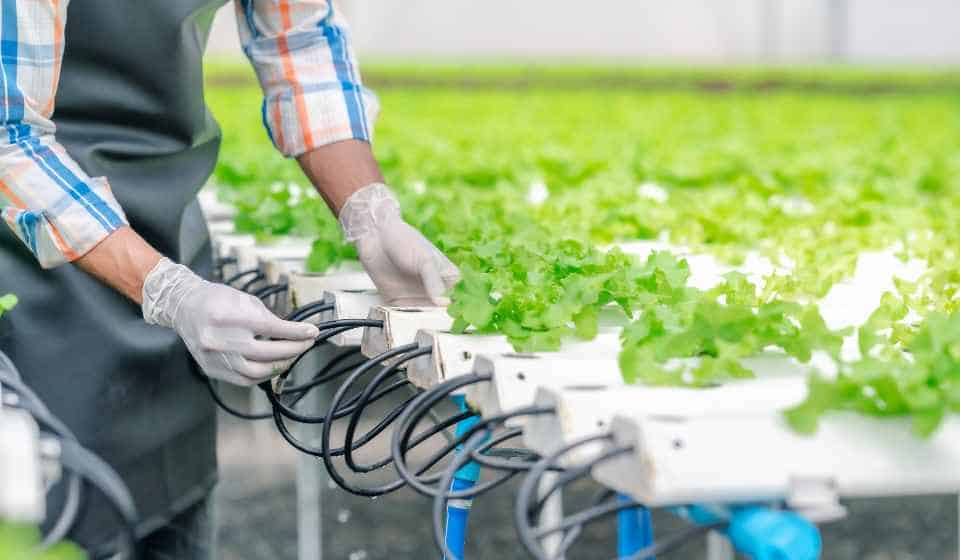
Although innovative kitchen garden technology presents many advantages, it has obstacles and constraints. This article analyzes various disadvantages that prospective users should contemplate before adopting these advanced horticulture technologies.
1. Initial Cost Investment
Initial investment is one of the principal obstacles to entry for smart kitchen gardens. Including sophisticated sensors, LED grow lamps, and automated irrigation mechanisms can substantially increase the cost of these systems compared to conventional gardening installations.
Those with limited financial resources may find the cost prohibitive, thereby reducing its accessibility to a broader demographic.
2. Dependence on Technology
The heavy reliance of intelligent gardens on technology is both an asset and a vulnerability. Technical errors, power disruptions, or system failures can disrupt the intricate equilibrium automated systems strive to uphold, posing a risk of damage to or fatality to the facilities.
This reliance may diminish users’ sense of autonomy over their gardens and may result in additional complications if they need more technical expertise to resolve issues as they arise.
3. Learning Curve and Complexity
Although they appear easy to use, specific smart kitchen garden systems require some initial adjustment. Novice users must acquaint themselves with every aspect of the system’s functioning, encompassing the configuration of applications and the optimal utilization of the provided data and controls.
The formidable nature of these systems may dissuade persons who favor the need to Tramore convincedness of conventional horticulture.
4. Sustainability and Environmental Concerns
Bright gardens can conserve water and eliminate the need for hazardous chemicals, but they also raise concerns regarding sustainability. Environmental costs are associated with the production and dispersal of high-tech horticulture systems, such as electronic refuse, and the carbon footprint generated during the fabrication of complex components.
Operating these systems additionally necessitates electricity, which may increase the user’s energy usage.
Also Read: How to Start a Kitchen Garden: A Comprehensive Guide
5. Restricted Plant Varieties

Smart kitchen gardens frequently have a more restricted range of cultivable items than conventional outdoor gardens. Numerous small-scale cultivation systems are available, some of which may need to be more suitable for larger or root-intensive plants.
Those who desire to cultivate a greater variety of crops may find this restriction frustrating, as it can restrict the production of a particular variety of produce.
6. Maintenance and Replacement Costs
Smart garden systems are susceptible to degradation just like any other technological innovation. Parts require replacement over time, and LED lighting might lose their intensity and need to be replaced. Although these systems are marketed as convenient, unanticipated expenses and labor may be incurred for replacements and maintenance.
7. Potentially Less Engagement with Nature
Intelligent garden systems optimize gardening procedures, potentially resulting in a more disengaged gardening encounter. The tactile experience of conventional gardening, considered therapeutic and rewarding by many enthusiasts, must be more conspicuously lacking.
An analogous degree of engagement and satisfaction might not be derived from an intelligent kitchen garden for individuals searching for a more profound communion with nature.
8. Space Limitations
Despite their space-efficient designs, indoor kitchen gardens can consume valuable real estate in compact living areas. It may be difficult for individuals to accommodate even a compact system in a confined residence, and finding a location that satisfies the system’s light and temperature needs can further complicate matters.
Summary: Innovative kitchen garden technology offers innovative gardening, but its limitations must be considered. Users should weigh environmental impacts, personal preferences, costs, and efficiency to determine their suitability for urban agriculture and personal goals.
Also Read: Fast Growing Vegetables in Pots
Future of Smart Kitchen Gardening
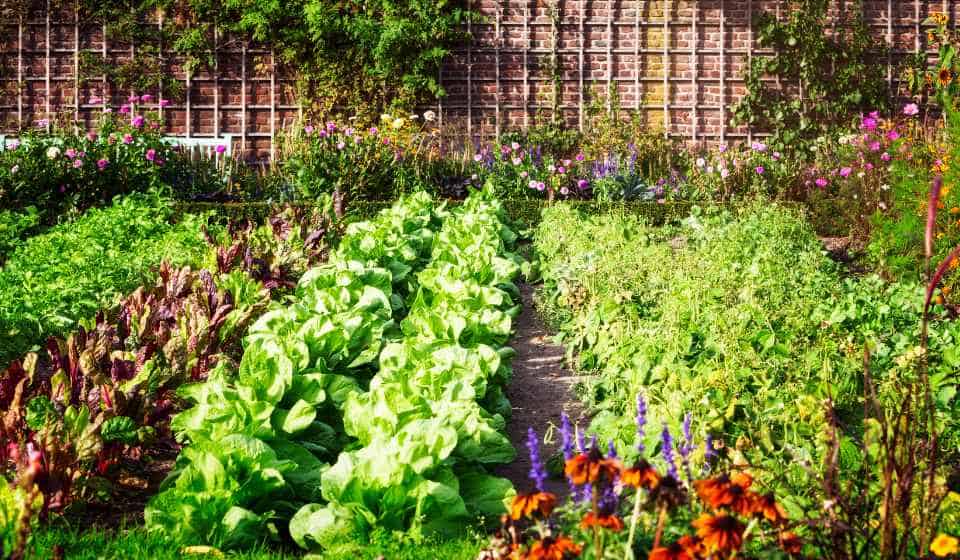
As technological advances further transform the methods we cultivate and consume food, smart kitchen gardening is anticipated to experience substantial expansion and intricacy in the coming years.
The advent of the personal food production era brings promising prospects and thought-provoking obstacles. In the following discourse, we examine many facets that will influence the trajectory of intelligent culinary gardens.
1. Increased Adoption and Accessibility
With the increasing integration and normalization of technology across various domains, smart kitchen gardens will likely experience a similar surge in acceptability and implementation. Future households may consider these systems standard components of a connected home.
In addition, we anticipate a reduction in cost as the technology advances and achieves a more significant scale, thereby rendering these groundbreaking horticulture solutions more affordable for a broader range of individuals.
2. Advancements in Technology
The ongoing development of automated systems, sensors, LED lighting, and other technological components of bright kitchen gardens will result in even more user-friendly and effective systems.
Artificial Intelligence (AI) and machine learning have the potential to contribute significantly to this endeavor by improving various system functionalities, including but not limited to optimal resource allocation, parasite detection, and growth prediction.
Also Read: Revolutionize Your Garden with Solar-Powered Tools
3. Integration with Smart Home Ecosystems
Smart kitchen gardens are anticipated to exhibit enhanced integration with other intelligent household devices, optimizing user convenience. You may be able to monitor and control your kitchen garden through the same app that regulates your home’s temperature, security, and lighting using smart home technology.
4. Personalized Gardening Experiences
Big data analytics and artificial intelligence advancements may enable intelligent garden systems to comprehend better and adapt to the specific requirements of each user. Personalized interactions with these systems may include recommendations for plant selection based on individual dietary preferences, tailored care instructions, and predictions regarding the harvesting readiness of crops.
5. Advances in Plant Science
When combined with developments in plant science, future intelligent kitchen garden systems could support a greater variety of crops, including those that were previously challenging to cultivate indoors. By diversifying the food supply chain, this strategy specifically addresses the needs of consumers who desire greater autonomy from external food suppliers.
6. More Sustainable Practices
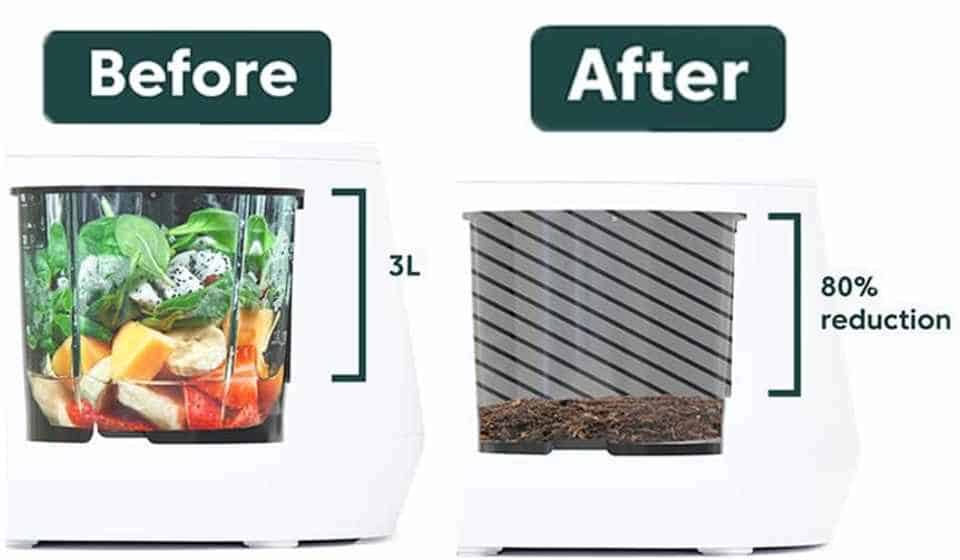
Click the image to buy on Amazon
There is a widespread trend in all industries toward adopting sustainable practices, and intelligent kitchen gardening is no different.
Subsequent approaches might prioritize the mitigation of electronic waste, the advancement of biodegradable constituents, the utilization of renewable energy sources, and the integration of closed-loop systems such as aquaponics to sustain and improve the ecological sustainability of said systems.
7. Increase in Community-Based Solutions
An upswing in community-oriented kitchen gardening solutions may inspire a new way of sharing resources and spaces. Virtual platforms can establish networks wherein individuals can exchange produce, share advice, or collectively acquire more advanced, sizable systems for the everyday use of an apartment complex or community.
8. More Significant Impact on Policy and Urban Planning
Intelligent kitchen gardens may impact urban planning and policy as urban agriculture gains further traction. Prospective infrastructures may integrate mandates or inducements to adopt indoor agricultural technology within commercial and residential towers.
Also Read: Fastest Growing Vegetables: From Seed to Table in No Time
Conclusion
Intelligent kitchen horticulture is expected to become a dynamic and intuitive part of everyday life, with significant implications for global food security, personal health, and ecological sustainability. Innovative kitchen garden technology, combining hydroponics, aeroponics, IoT, and AI, enables individuals to cultivate fresh, organic produce in their homes.
As technology advances, achieving sustainable, efficient, and self-sufficient food production becomes more promising, leading to a future where fresh, nutritious food is readily available from our kitchens.
Keep Reading
- Unearthing Expert Tips to Start a Garden From Scratch
- How to Make Money with Gardening
- Best 9 Self-Watering Tomato Planters
- 12 Top Gardening Tools For Your Ease
- Best Gardening Tools According To Experts
- 6 Smart Home Lawn And Garden Products?
- How to Grow Fruit Trees in Containers
Recent Posts
Here is reply of high-demand removable wallpapers. The wallpaper industry has changed a lot in recent times, with the launch of removable wallpaper being seen as a blessing for homeowners, renters,...
Brown is an often neglected color when considering interior design but brown decor living room ideas could make your house feel warm, sophisticated, and timeless. More adaptable than any other...
